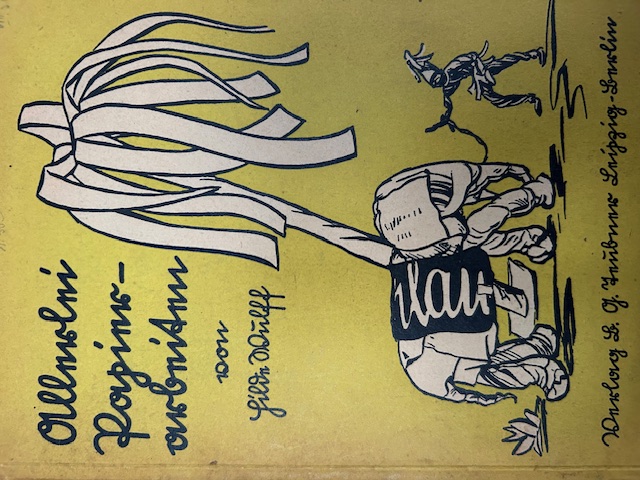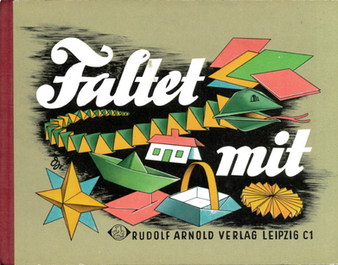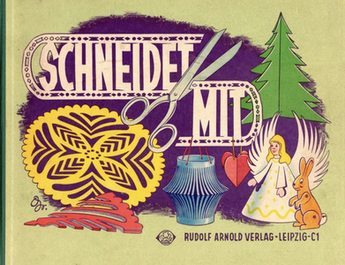As anyone who has been following this blog will probably have realised by now, I like books. Especially books on two of my favourite subjects, origami and magic. Recently I've managed to get hold of a number of old German books on paperfolding and paper cutting, and in this post I'm going to look at a few of the most interesting ones.
For examples of paperfolding in really old books, see my posts on Artful letter closures from 1831 and the Folded seed packet, and also A 150-year-old Wallet Fold. A number of old German magic books have instructions and illustrations for the folded paper novelty known as Troublewit, and there are many volumes on napkin folding, from the very early ones to a whole host of works from the late 19th century (as described in Folded Beauty by Joan Sallas).
Allerlei Papierarbeiten
This interesting little book from the Friedrich Fröbel tradition has been around a long time and has a slightly confusing history. Here are the editions I've been able to identify online:
Allerlei Papierarbeiten (1910) by Hildegard von Gierke and Alice Davidsohn (1st edition)
Allerlei Papierarbeiten (1921) by Hildegard von Gierke and Alice Dorpalen (4th edition)
Allerlei Papierarbeiten (1936) by Hilde Wulff and Carola Babick (7th edition)
Allerlei Papierarbeiten (1940) by Hilde Wulff and Carola Babick (8th edition)
Allerlei Papierarbeiten (1941) by Hilde Wulff and Carola Babick (9th edition)
I have the 4th and 7th editions, which are very different in terms of their content. Despite the images below, the older one is also quite a bit smaller. Wikipedia tells us that Hildegard von Gierke was a teacher at the Pestalozzi-Fröbel-Haus in Berlin, and also seems to suggest that Alice Davidsohn and Alice Dorpalen were the same person (born Alice Kuczynski). The 7th edition is a complete revision with a new layout and illustrations by Carola Babick. The 9th edition is available online and is practically identical to the 7th edition. Details of the contents are provided by David Mitchell in the Public Paperfolding History Project.
4th edition (1921) | 7th edition (1936) |
Lustiges Papierfaltbüchlein
This is another book that's been through many editions with a lot of changes along the way. The Public Paperfolding History Project gives the date of first publication as 1927. I have an old edition with an introduction dated 1925 (maybe the actual publication was delayed), and also the 9th edition of 1954 with basically the same cover illustration but smartened up and in full colour. The author says it's a revised edition containing mostly the original material together with some new models and improved illustrations. She also comments that existing books on paperfolding in which points and corners are labelled with letters are often confusing even for adults, let alone children. The new diagrams and layouts are in fact much clearer and more complete than in the old version.
The French version Nouveaux jeux et occupations pour les petits (1951) is really a different book altogether, with most of the paperfolding material from the German edition of 1954, rearranged and redescribed, plus a lot of other craft material including things that don't use paper. Then there's another German version of Lustiges Papierfaltbüchlein (1962) (12th edition, heavily revised and updated by F. Schäfer) with photos on the cover and inside, and also a more modern reworking with the slightly different title Das lustige Papierfaltbüchlein (1988) by Johanna Huber and Christel Claudius, and an English version Easy & Fun Paper Folding (1990).
Walter Sperling
Walter Sperling (1897-1975) was a German magician, illustrator, graphic designer and author (information from Zauber-Pedia). In addition to a large number of books on magic tricks, games and puzzles he also wrote two on paperfolding and paper cutting: Papier-Spiele (1955), translated into English as How to Make Things Out of Paper (1961), and Lustige Spiele mit Papier (1963). Sperling seems to me to have been a sort of German version of Joseph Leeming, the American author of an even larger number of books on magic tricks, games and puzzles including - most importantly for us - Fun with Paper (1939) and Papercraft (1949).
Rudolf Arnold Verlag books
The former East German publisher Rudolf Arnold Verlag in Leipzig published a number of books on paperfolding and paper cutting. It's hard to be sure of the first publication dates since they are not always indicated, and secondhand book dealers give different dates because there were clearly multiple editions. The dates shown are either those in my own copies or ones I've found online, and might not always be the first editions.
Faltet mit (1955) by Gerta Schumann
Schneidet mit (1956) by Gerta Schumann
Wir falten (1961) by Joachim Schönherr
Wir schneiden (1962) by Joachim Schönherr
Mein Tierpark (1964) by Hans Linde
Wir falten und falzen (1972) by Joachim Schönherr
Mit Papier und Schere (1979) by Helga and Joachim Schönherr
Most of these are beautifully illustrated by Hans Greschek. Mein Tierpark (1964) is unusual in that it uses drawings of origami animals (in some cases with a bit of artistic licence) to illustrate a story, but without including instructions on how to make them.
A similar book on folding and cutting is is Schnipsel, Schnapsel (1958) by E. Kallista, published by Verlag Rudolf Forkel.
More books
There are of course many more German books not covered here. A number of them can be seen in the "More" section of the site menu under the heading German paperfolding books.








































Hi Edwin, I'm afraid this has nothing to do with origami, but we were talking about you in Ingolstadt the other day and would love to hear from you again if you read this. Hope all is OK with you. My e-mail address is still the same @t-online.de, cheers, Edward 🙂